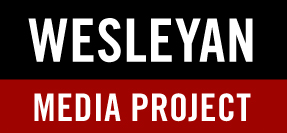
This January, Wesleyan-based research featured in national news when the Bipartisan Policy Center released a major report entitled “Campaign Finance in the United States: Assessing an Era of Fundamental Change” that relied heavily on data from the Wesleyan Media Project (WMP), and is likely to land on the desks of a number of legislators this year.
The WMP, one of Wesleyan’s most behind-the-scenes academic ventures, continues to exert influence on Washington, D.C. in a big way. The Project, in its eighth year of existence under the leadership of Associate Professor of Government Erika Franklin Fowler, serves as an example of how Wesleyan social science research can have an effect outside academia.
“We are proud to have played an important role in the Campaign Finance Task Force Report published by the Bipartisan Policy Center,” Fowler said in an interview with The Argus.
“They do a great job,” agreed University President Michael Roth ’78 in a separate interview. “I think it’s been an important service, in terms of making it available to the whole country.”
Under Fowler’s watch, Wesleyan serves as the hub for the intercollegiate research group co-directed by Michael Franz (Associate Professor of Government and Legal Studies at Bowdoin College) and Travis Ridout (Associate Professor in the School of Politics, Philosophy and Public Affairs at Washington State University). At the bottom end, student coders at Wesleyan, and more recently at Cornell University, watch political advertisements for the Project and record a wide array of information. Fowler and her team collect this information, analyze it, and report on it, with the ultimate goal of use by think tanks like the Bipartisan Research Center (BPC). One student coder, Meg Cummings ’20, described her specific role in WMP’s research this year.
“The Wesleyan Media Project looks at trends in political advertising across the country,” Cummings said. “So my job is to watch the hundreds of ads provided to me and input data about them, which can include anything from the gender of the candidate to whether they mentioned Obamacare. This year, in addition to submitting this data, a team of students helped compile the list of variables to pay attention to in the ads, based on a specific policy category, to be used in that process.”
“Professor Erika Franklin Fowler and her colleagues in the Wesleyan Media Project, Travis Ridout and Michael Franz, produced literature reviews on campaign spending on television advertising and on media, and along with the Center for Responsive Politics, conducted a study of undisclosed money in the campaign finance system,” reads the BPC report in summation of WMP’s contributions.
This scholarship included data on campaign spending by Super PACs, interest groups, and political parties, as well as campaign finance reporting to the Federal Election Commission. While this summary only scratches the surface of WMP’s research, it offers a clear snapshot of how the Project’s research can be put to use going forward.
“We are gearing up for 2018 midterm tracking,” Fowler said of the WMP’s future plans. “In addition, WMP data and research continue to play an important role informing policy discussions surrounding health insurance/health reform and campaign finance.”
WMP has popped up elsewhere in the news recently as well. Last year, WMP found a significant correlation between the volume of health insurance television advertisements and improving coverage rates under the Affordable Care Act. This research was cited in a letter penned by House Democrats on the Energy and Commerce Committee that was sent to Tom Price, the former chair of the House Committee on the Budget and now-former Secretary of Health and Human Services. The link here between WMP and potential policy outcomes is self-evident. Regardless of whether or not Price specifically may have been swayed by the research, the Project has certainly inserted itself into the public consciousness of Washington, D.C. lawmakers.
Fowler declined to comment on the impetus and goals of WMP’s collaboration with Cornell, but all indications are that the Project has ambitious expansion plans moving forward.
“The Wesleyan Media Project continues to expand its focus,” Fowler said. “In addition to tracking campaign advertising on television during elections, we are also tracking health insurance advertising and local television news coverage of politics and policy. In addition, we now have access to digital advertising data, which we’ll be incorporating into our 2018 midterm analyses.”
President Roth agreed that WMP would have to remain dynamic moving forward, but reiterated his support and trust in Fowler and company.
“I think the terrain has shifted,” he said. “Social media has become more important and television perhaps less important, but one of the ways we figure that out is through the kinds of analysis that the Wesleyan Media Project does. I’m a huge fan, and as we move towards the congressional elections this fall, it’ll become even more important.”
Sam Prescott can be reached at sprescott01@wesleyan.edu or on Twitter as @sam_prescott16.



Leave a Reply